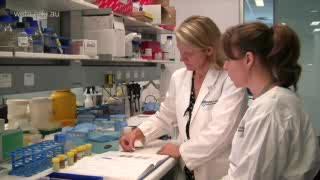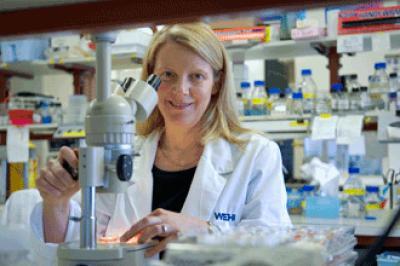Associate Professor Jeff Kerr said that when these egg-producing cells were missing the PUMA protein, they did not die after being exposed to radiation therapy. "This might ordinarily be cause for concern because you want damaged egg cells to die so as not to produce abnormal offspring," he said. "To our great surprise we found that not only did the cells survive being irradiated, they were able to repair the DNA damage they had sustained and could be ovulated and fertilized, producing healthy offspring. When the cells were also missing the NOXA protein, there was even better protection against radiation."
"We were very excited to see healthy offspring could be produced from these cells," Associate Professor Scott said. "It means that in the future, medications that block the function of PUMA could be used to stop the death of egg cells in patients undergoing chemotherapy or radiotherapy. Our results suggest that this could maintain the fertility of these patients."
A joint leader of the study, Professor Jock Findlay, head of the Female Reproductive Biology Group at Prince Henry's Institute, said the study could also have implications for delaying menopause. "We know that the timing of menopause is influenced by how many egg cells a female has," he said. "Interventions that slow the loss of egg cells from the ovaries could delay premature menopause. As well as prolonging female fertility, such a treatment could have the potential to reduce menopause-associated health conditions, such as osteoporosis and heart disease."

Researchers have identified a protein which is important for the death of egg cells in the ovaries. The finding could lead to new ways to prevent infertility in cancer patients and delay premature menopause.Associate Professor Clare Scott, Walter and Eliza Hall Institute, and Professor Martha Hickey, The Royal Women's Hospital and The University of Melbourne, discuss the significance of the finding, which was made by researchers at Walter and Eliza Hall Institute, Monash University and Prince Henry's Institute of Medical Research, Melbourne, Australia.
(Photo Credit: The Walter and Eliza Hall Institute of Medical Research, Melbourne, Australia)

Associate Professor Clare Scott of the Walter and Eliza Hall Institute was one of the researchers leading a study that has suggested new ways to protect female fertility.
(Photo Credit: Walter and Eliza Hall Institute, Australia)
Source: Walter and Eliza Hall Institute